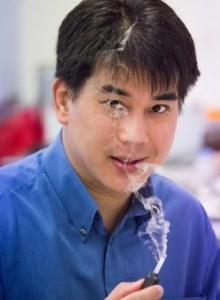The Royal Melbourne Institute of Technology (RMIT) has developed a revolutionary technology that has the potential to revolutionise how patients are treated with drugs.

Image credit: RMIT
The revolutionary RespiteTM nebuliser is an affordable, light-weight and portable device that could one day deliver life-saving cancer drugs and vaccines traditionally given by injection, RMIT said in a news release.
“Anything we can nebulise, we can potentially deliver. The problem with normal puffers is that only 30 per cent of the drugs actually get to the lungs, the rest is lost in the mouth – which isn’t a problem if the drugs are cheap but is when they are expensive,” said Professor Leslie Yeo, Director of RMIT’s MicroNanophysics Research Laboratory.
“The most important aspect of the device is that it does not require inhalation to generate the aerosols as with the ubiquitous inhalers which can be a problem for people already suffering compromised lung function. And unlike one-size-fits-all inhalers, Respite allows the dose to be adjusted based on a patient’s size, age, gender, physiological profile and disease severity.’’
According to the news release, the revolutionary nebuliser does not require meshes or nozzles unlike most other nebulisers, so there is no clogging or fouling problems that diminish performance, and delivers drugs at rates of up to 3 ml/min, compared to the much smaller doses of 0.4 ml/min benchmark of current nebulisers.
Aside from having enormous potential to be used in lung cancer treatment, the nebuliser can also be used for a range of non-pharmaceutical applications such as perfumes, cosmetics and sterilisation of equipment and surfaces.
“The five-year survival rate for lung cancer remains around 15 per cent despite the significant therapeutic advances achieved in recent years and currently, there are no personalised delivery devices for inhaled cancer drugs to improve these clinical outcomes. Our nebuliser addresses this gap as a low-cost and convenient yet efficient method of delivering oncolytics directly to the lungs, potentially revolutionising the treatment of lung cancer,’’ said Yeo.
The RespiteTM nebuliser can also be used to administer insulin to people with diabetes or to painlessly vaccinate infants currently subjected to needles.
“When I was a small boy growing up in Malaysia, my mother who was a doctor had to vaccinate all the children in the local school against TB and she always had a few left over which she gave to me when she got home,’’ said Yeo.
“I made it my life’s mission from an early age to reduce the number of injections a child has to have.’’
The patented technology was among 10 RMIT-developed technologies that were presented this week in Singapore at TechInnovation 2015, a premier industry-to-technology event.
For more detailed information, please go to http://www.rmit.edu.au/




















